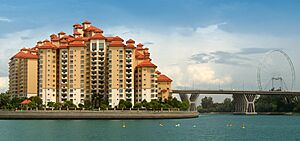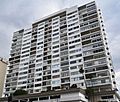Condominium facts for kids

A condominium, often called a condo, is a type of home where you own your specific unit. It's different from renting an apartment because you actually own the space.
Condos are often found in apartment-style buildings. However, some condos look like regular houses! These are called "detached condominiums." Even though they look like single-family homes, the yards, outside parts of the building, and streets are owned and taken care of by everyone in the community together.
When you own a condo, you also share ownership of the common areas. These are places like hallways, walkways, laundry rooms, and shared facilities like swimming pools or gyms. All the owners work together through a group called an owners' association to manage and maintain these shared spaces.
The idea of shared ownership like a condominium has been around for a very long time. Scholars have found records of it being used in ancient Babylon almost 2,000 years ago!
Contents
What is a Condominium?
The main difference between a condominium and an apartment building is how the homes are owned. You can't tell if a building is a condo or an apartment just by looking at it.
- Condominium: Each unit is owned by a different person or family. The owners also share ownership of the common areas.
- Apartment: The whole building is owned by one person or company. They rent out individual units to different tenants.
Because people buy condos, builders often make them with higher quality materials than rental apartments.
When you own a condo, you technically own the "air space" inside your unit. This means you own the space within your walls, floor, and ceiling. You can usually make changes inside your unit without affecting the common areas.
Everything outside your unit's boundaries, like the outer walls, roof, and land, is owned by all the condo owners together. A special group, often called a corporation or association, holds this property in trust for everyone.
Rules for Condo Living
Living in a condominium means sharing spaces with others. Because of this, there are usually rules called "conditions, covenants, and restrictions." These rules help everyone share the property fairly and keep the community running smoothly. They cover things like noise, pets, and how common areas are used.
Some condos are made up of single-family houses. In these "detached condominiums," homeowners don't have to take care of the outside of their homes or their yards. This is because these areas are maintained by the community association.
Where Did Condos Come From?
The word "condominium" comes from Latin. It's made of two parts:
- con- means "together"
- dominium means "domain, property, or ownership"
So, "condominium" literally means "shared property."
Long ago, the word "condominia" (the plural form) was used for territories that two or more countries shared control over. This was often a way to solve disagreements about borders.
Condos Around the World
The term "Condominium" is used in the United States and most parts of Canada. But other countries have different names for this type of shared ownership:
- Australia and New Zealand: They use the term Strata title.
- United Kingdom: They use commonhold.
- South Africa: They use sectional title.
- Italy: They say condominio, which is the modern Italian version of the Latin word.
- Quebec (Canada): While "condo" is often used, the official term is copropriété divise.
- France: They simply use copropriété, which means "co-property." A group called a Syndicat de copropriété usually manages the shared areas.
- Spanish-speaking countries: They use propiedad horizontal. This literally means "horizontal property," but it means that all owners are equal and on the same level.
Images for kids
-
The Cosmopolitan, a condominium in Singapore
-
The Luminary, a condominium in Tammela, Tampere, Finland
-
The interior of a loft condominium in Chicago's west side, USA
-
The Wilshire Regent condominiums in Los Angeles, California, U.S.
-
Aqua waterfront condominiums in Long Beach, California, U.S.
-
A historic mansion converted into condominiums in Chicago, U.S.
See also
 In Spanish: Condominio para niños
In Spanish: Condominio para niños
 | DeHart Hubbard |
 | Wilma Rudolph |
 | Jesse Owens |
 | Jackie Joyner-Kersee |
 | Major Taylor |









